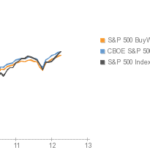Despite well-known IPO disasters like Facebook (FB), the First Trust IPOX Index ETF (FPX) was the best performing of all strategy ETFs in 2012, delivering returns 8% higher than the S&P 500 after dividends.
The ETF continues to test the idea that IPOs are much better for the business than they are investors. While the failed IPOs are the ones we are most likely to remember, the smaller IPOs that fly under the radar do seem to create impressive total returns for investors willing to invest in new businesses as they go public.
Here’s a chart of the five year performance for FPX vs. the SPY:

How the IPO ETF Works
The First Trust IPOX Index ETF (FPX) has an interesting rules-based strategy to play new and upcoming IPOs. The fund invests in new IPOs after they have traded for seven days, then holds the position until the 1000th day of trading. The ETF misses out on any first day pop or drop, buying only after a rational market has priced shares (see more efficient market hacks). This may be the fund’s saving grace. Facebook, the fund’s second-largest position, fell by 17% in the first few days of trading. Visa (V), the largest position and undoubtedly one of the fund’s best performers was mostly flat in the first seven days after IPO.
The First Trust IPOX Index ETF returns are most impressive when one considers the extent to which it chases diversification and liquidity. The fund buys into only the largest IPOs and holds 100 different stocks after IPO. Value-weighted, the fund is most aggressive with stocks that have the lowest relative valuation. As of September 2012, the fund held companies with a low 9.49 price to cash flow ratio and a 17.68 price to earnings ratio.
The fund’s top holdings include:
- Visa (V) – 10.6%
- Facebook (FB) – 8.0%
- General Motors (GM) – 7.0%
- Kinder Morgan (KMI) – 6.3%
- Phillips 66 (PSX) – 5.2%
The Case for Rational IPO Plays
The First Trust IPO ETF is one of the few strategy ETFs that may play into a common valuation flaw by buying into companies that are not well known and which may be mispriced after going public. This is very similar to the spin-off ETF, which has also delivered market-beating returns. (Some of the holdings in the IPO and spin-off ETF are the same; Phillips 66 was spun off from Conoco Phillips, for example.)
The value-weighting may also add to outperformance, given that the weighting requires that it invest most heavily in companies that are making a profit. Of the companies that have delivered the weakest post-IPO returns, most have been new internet and technology plays which were unprofitable from the start. Groupon (GRPN), Zynga (ZNGA), Angie’s List (ANGI), were all unprofitable at IPO, and all have declined significantly since the first day of trading on the public markets.
The biggest risk for IPO ETF investors is that the fund will be shuttered. First Trust has yet to collect large scale investors, only $26 million is invested in the fund at the present time. Given the fund’s performance, however, it seems unlikely that First Trust would close the fund. The fund’s annual expense ratio of .6% certainly isn’t covering costs for First Trust, but it isn’t significantly reducing returns for investors, either.
Disclosure: the author has no position in any tickers mentioned here.











{ 0 comments… add one now }